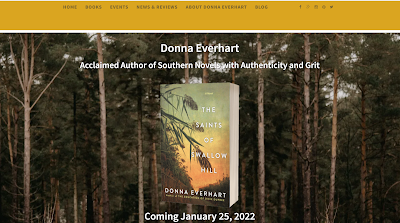Donna Everhart is the USA Today bestselling author of Southern fiction with authenticity and grit, including the Indie Next List THE EDUCATION OF DIXIE DUPREE, THE FORGIVING KIND, THE MOONSHINER'S DAUGHTER, and the Southeastern Library Association Award-winning novel, THE ROAD TO BITTERSWEET. Born and raised in Raleigh, she and her husband live just an hour away in Dunn, North Carolina. Her website is https://www.donnaeverhart.com/
1. How and when did you get hooked on history?
My interest was likely sparked years ago while I was still in school. I recall enjoying history classes better than math or science. However, like many students, once I was no longer in a classroom, other interests took over, and in my case this was my job, marriage, kids, etc. I became interested again as I started writing novels.
2. What role does history play or has it played in your personal life?
I share what I learn with members of my family and friends, for one. This leads to some pretty interesting, personal discussions, and so often there are gold nuggets uncovered in these conversations. One thing I love is discovering something that is relatively unknown, and then sharing it with anyone who will listen.
3. How does history play a part of your professional life/career?
As a novelist of Southern historical fiction, it's obviously a critical piece to the project I am currently involved with. As I begin to uncover facts, dependent on what I am writing about, I am painfully aware the exploration and discovery phase are key. I know whatever I uncover will become the building blocks of the story. History always creates the foundation, the stepping stone into a story.
My interest was likely sparked years ago while I was still in school. I recall enjoying history classes better than math or science. However, like many students, once I was no longer in a classroom, other interests took over, and in my case this was my job, marriage, kids, etc. I became interested again as I started writing novels.
2. What role does history play or has it played in your personal life?
I share what I learn with members of my family and friends, for one. This leads to some pretty interesting, personal discussions, and so often there are gold nuggets uncovered in these conversations. One thing I love is discovering something that is relatively unknown, and then sharing it with anyone who will listen.
3. How does history play a part of your professional life/career?
As a novelist of Southern historical fiction, it's obviously a critical piece to the project I am currently involved with. As I begin to uncover facts, dependent on what I am writing about, I am painfully aware the exploration and discovery phase are key. I know whatever I uncover will become the building blocks of the story. History always creates the foundation, the stepping stone into a story.
4. Why is studying/knowing history important?
Generally speaking, as we go about our day to day lives, oftentimes there is a disconnect between the past and the present. Unless individuals are motivated to understand the "backstory," i.e. history, not only their personal past, but beyond that to the country's past, etc., current actions or directions taken might seem meaningless. Every single thing about our present existence is based on personal/direct and indirect historical events. Everything that has happened in the past is a direct result of where we are today. One particular thing of late is how many people are now interested in the ancestry, where they came from, and who they are. This is great, and a stepping stone for further explorations.
5. What is your favorite period or aspect of history to learn about and why?
Pretty much anything from the mid-19th century up to the mid-20th century. I can't really put my finger on why this period pulls me in, other than I love the simplicity of the time. I am drawn to how people lived, worked, and socialized. I find it fascinating what they believed in, how they spoke, what they ate, and how they went about their day to day life. When I was growing up, all of Laura Ingalls Wilder THE LITTLE HOUSE ON THE PRAIRIE books were my favorites. Eventually I would go on to read massive tomes like SACAJAWEA, the captivity story of Cynthia Ann Parker called RIDE THE WIND, ANDERSONVILLE, and POCAHONTAS, and many, many other historical fiction books. Of course these were novels, with embellishments and made up story lines, but they were also filled with facts.
6. What do your novels have in common? Is there a common thread running through them?
While they're stand-alone novels, if there is a common thread, it's that the they're Southern historical fiction. Generally, I like to take the current events of the story's time, and write about those challenges. For instance, in THE ROAD TO BITTERSWEET, the 1940 flood in the NC Appalachian mountains is the inciting incident. For THE FORGIVING KIND, racism, bigotry, homophobia, and cotton growing are focal points. (timeframe 1955) In THE MOONSHINER'S DAUGHTER, the illegal production of 'shine, and the history of the government sending revenuers to try and control are brought into focus. (timeframe 1960) In my latest, THE SAINTS OF SWALLOW HILL, I consider it a standout novel because I am writing about an industry many were unaware of - the turpentine camps of The Great American South, set during the Depression era.
7. How important is historical research in your writing?
It's absolutely critical, and with the latest book, THE SAINTS OF SWALLOW HILL, the research was extensive, and intensive. I wanted historical facts I intended to include to be as accurate as possible. To achieve this I attended a demonstration on distilling pine gum into tar, pitch and turpentine, as well as using facts about this uncommon work documented in dissertations, and theses. I studied how labor camps operated, the debt peonage systems they used, the Depression era, and much more. In all of my books thus far, I have never had a reader come forward to say I got something wrong historically. (knocks on wood) I try to be meticulous, and question everything before I put it in a novel.






No comments:
Post a Comment